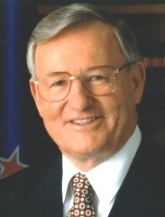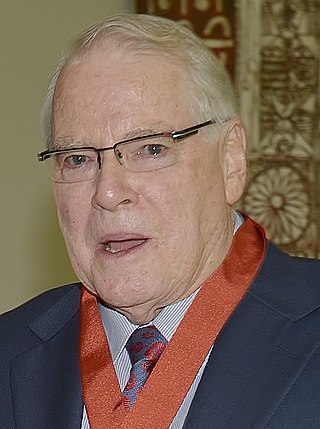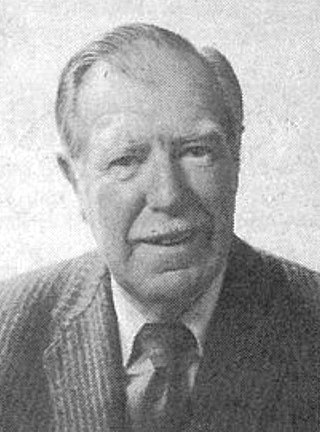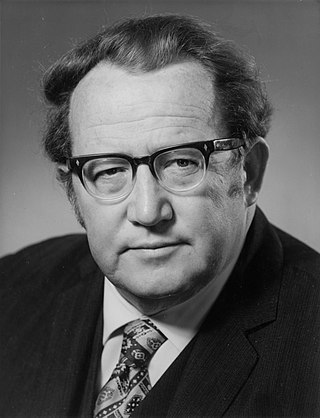
The 1990 New Zealand general election was held on 27 October to determine the composition of the 43rd New Zealand parliament. The governing Labour Party was defeated, ending its two terms in office. The National Party, led by Jim Bolger, won a landslide victory and formed the new government.

Sir Wallace Edward Rowling, commonly known as Bill Rowling, was a New Zealand politician who was the 30th prime minister of New Zealand from 1974 to 1975. He held office as the leader of the Labour Party.

Sir Francis Joseph Kitts was a New Zealand politician. Originally from the South Island, he served in the military and later was a civil servant before entering politics with the Labour Party. He was the Member of Parliament for Wellington Central between 1954 and 1960. He was also the longest-serving Mayor of Wellington, holding the post from 1956 to 1974. He was also a member at various times of several other local bodies and was still an elected official at his death.

The 1925 New Zealand general election was held 4 November to elect a total of 80 MPs to the 22nd session of the New Zealand Parliament.

Michael Edward Rainton Bassett is a former Labour Party member of the New Zealand House of Representatives and cabinet minister in the reformist fourth Labour government. He is also a noted New Zealand historian, and has published a number of books on New Zealand politics, including biographies of Prime Ministers Peter Fraser, Gordon Coates and Joseph Ward.

Sir Matthew Henry Oram was a New Zealand politician of the National Party. He was the 13th Speaker of the House of Representatives, from 1950 to 1957.

Francis Duncan O'Flynn was a New Zealand politician of the Labour Party.

William Patrick Jeffries is a former New Zealand politician of the Labour Party. He was elected as the Member of Parliament for Heretaunga and served as Minister of Transport and Minister of Justice.

Joseph Albert Walding was a New Zealand politician of the Labour Party. He represented the Palmerston North for several terms. After his retirement from Parliament, he became High Commissioner to the United Kingdom, but died within months of taking the post.

Sir Edward Michael Coulson Fowler was a New Zealand architect and author who served as mayor of Wellington from 1974 to 1983.

Sir Stephen Gerard "Tipene" O'Regan is a New Zealand academic and company director.
Southern Maori was one of New Zealand's four original parliamentary Māori electorates established in 1868, along with Eastern Maori, Western Maori and Eastern Maori. In 1996, with the introduction of MMP, the Maori electorates were updated, and Southern Maori was replaced with the Te Tai Tonga and Te Puku O Te Whenua electorates.
The Wellington Citizens' Association, was a right-leaning local body electoral ticket in Wellington, New Zealand. It was formed in 1911 by merging the selection process of council candidates of several civic interest groups and business lobby groups. Its main ambitions were to continue to control the Wellington City Council, reduce local spending and deny left-leaning Labour Party candidates being elected.

Helene Ruth Paula Ritchie is a former local body politician, registered psychologist and mediator, and a board member from Wellington, New Zealand. As Wellington's longest serving City Councillor of over 30 years, she led the Labour team to a majority position on the council. Later, she was the first female deputy mayor and chaired the Wellington Airport Authority and its successor for eight years.

Sir John Francis Jeffries was a New Zealand local politician, civil servant and later a judge of the High Court.

Rolland O'ReganFRCS was a New Zealand surgeon, activist and politician. He was the son of judge Patrick O'Regan and the father of Richard Mark O'Regan and businessman and academic Sir Tipene O'Regan.

Stuart Keith Spry was a New Zealand swimmer, conservationist and local politician. On his death The Dominion described him as "one of the great identities of Wellington city".

Piri John Ngarangikaunuhia Sciascia was a New Zealand Māori leader, kapa haka exponent, and university administrator. From 2016 until his death, he served as kaumātua and advisor to the governor-general and government of New Zealand.
Aaron Hape is a Fellow of the Royal Society of Arts and in 2017 became the first person of Māori descent to be invested as an Associate Fellow of the Royal Commonwealth Society.

David George Porter was a New Zealand architect, company director and politician. He was a Wellington City Councillor and Deputy-Mayor from 1970 to 1971.

















